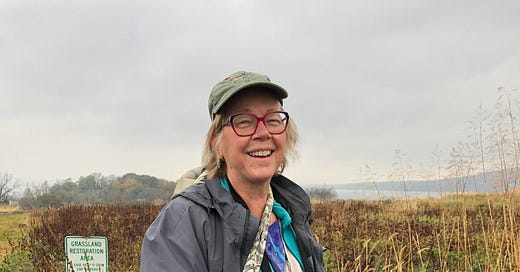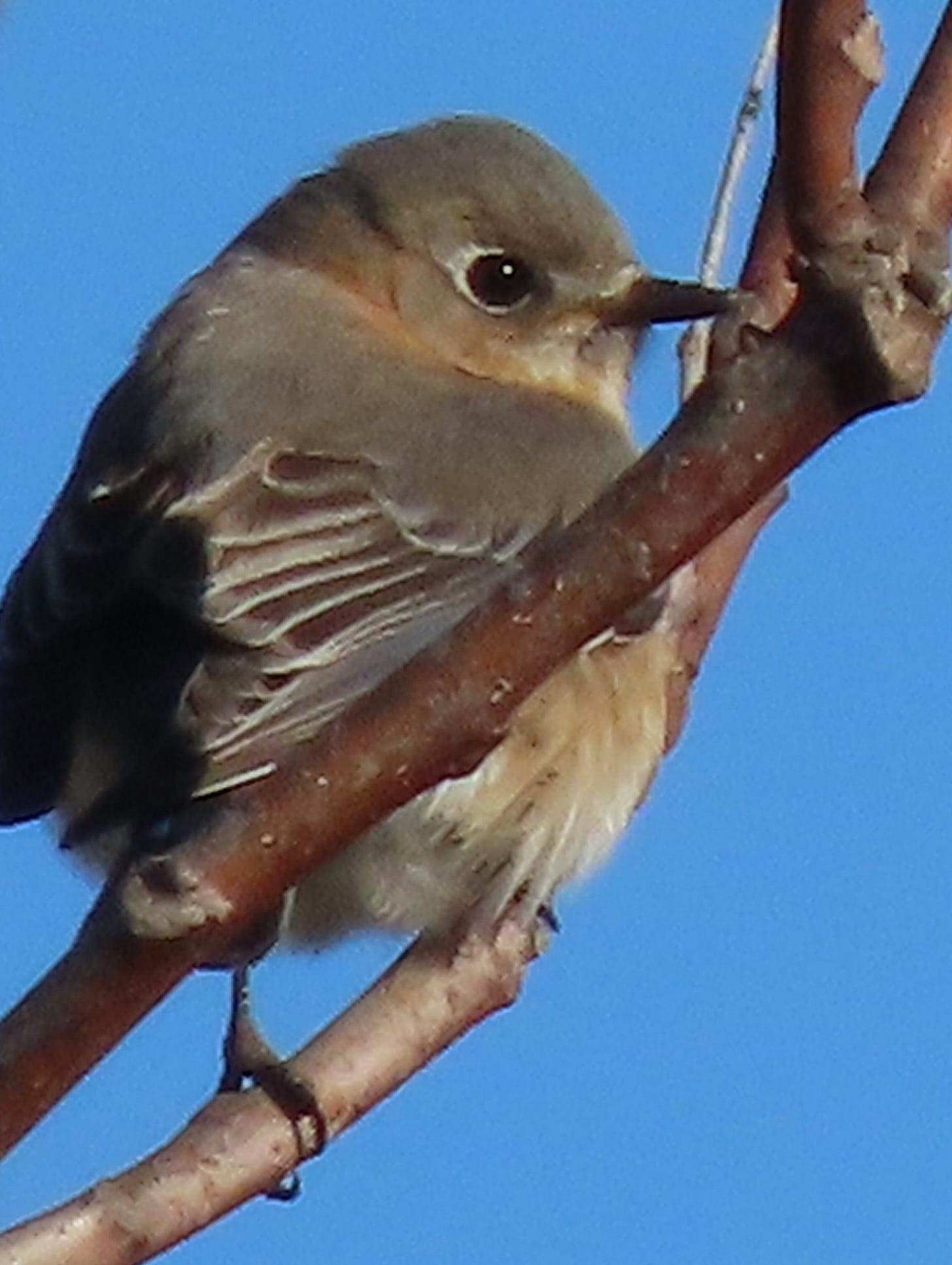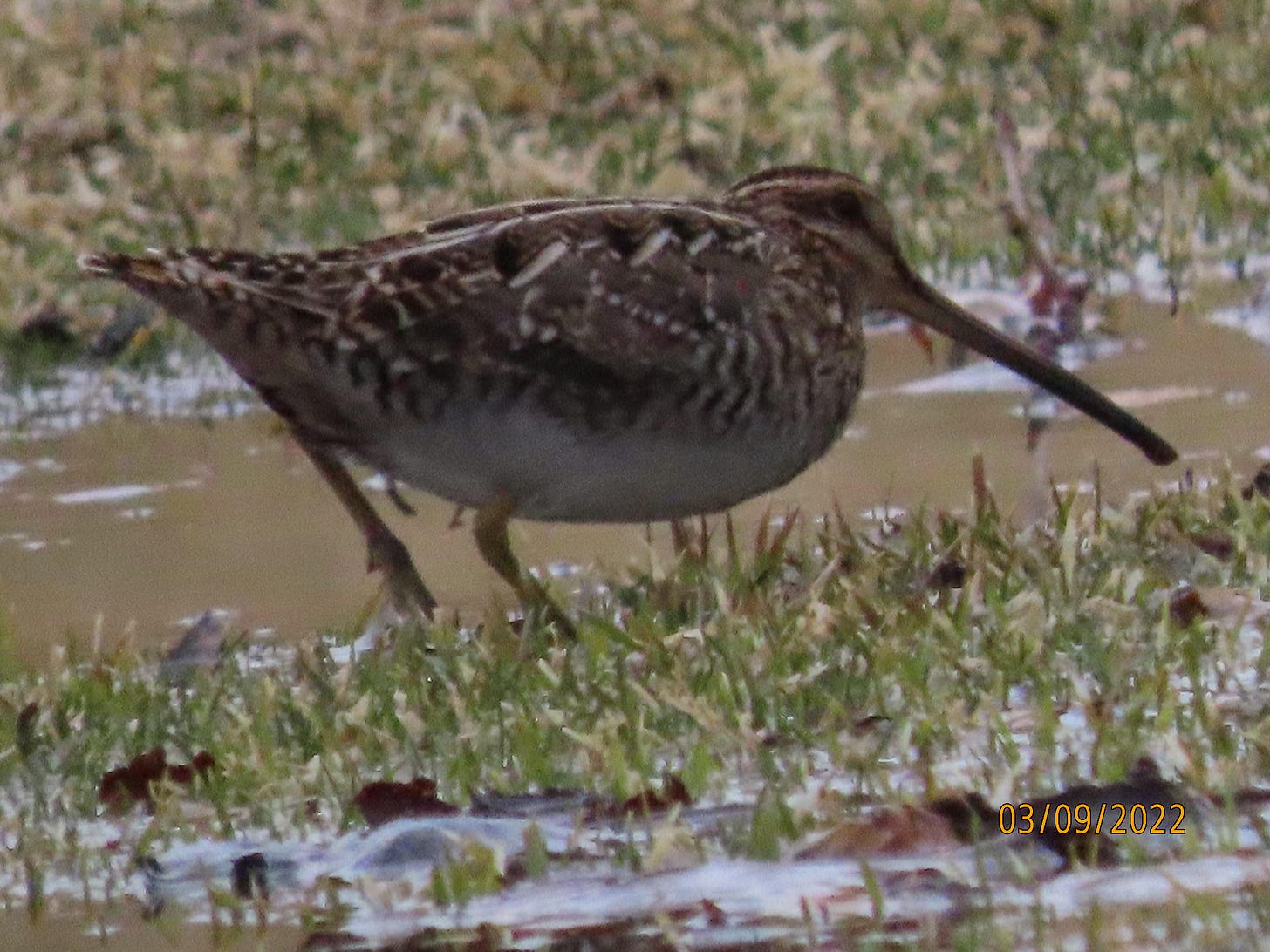Chronicle profile: Croton's Bird Commissioner, Cary Andrews
Croton-on-Hudson is apparently the only community in the U.S. that has a Bird Commissioner. The job is in very good hands, say those who know Cary Andrews.
[Note: This article is free to all readers]
“If birds are happy, people are happy,” says Cary Andrews.
It’s 8 am on a cloudy Tuesday morning, just after an overnight rain. Croton-on-Hudson’s Bird Commissioner is up on the grasslands of Croton Point Park, site of a notorious former landfill. The Hudson River flows off in the distance, and a light breeze blows through the grasses and wildflowers that Westchester County began planting here after the landfill was decommissioned in the 1980s.
Cary has been Bird Commissioner since January 2021, when Croton Mayor Brian Pugh appointed her. As far as anyone knows, Croton is the only community in the country that actually has one. Cary hopes the idea will eventually catch on. Thanks to climate change, birds are in real danger, with many species on the brink of extinction.
Armed with a pair of Zeiss Conquest 5 8x42 binoculars, Cary points out the birds we are seeing (the reporter accompanying her is armed with a much less impressive pair of old binocs.) A harrier (a kind of hawk) suddenly swoops over and dives into the grass. Somewhere nearby a Savannah sparrow is calling; Cary can tell the species just by the sound. But she’s not carrying a thick Sibley guide to birds, as she might have a decade ago. Instead she carries her smart phone, installed with two apps, eBird and Merlin, hosted by the Cornell Lab of Ornithology.
Since it just rained, there are not a lot of birds fluttering about right now. “They get a little skulky after a rain,” Cary explains. Their feathers are wet and it’s not as easy to fly. But she does not apologize for the diminished avian presence.
“It’s not so much how many birds you see and what you see, it’s just being there. It heightens your senses and your appreciation of the natural world. You don’t know what you are going to see next.”
Cary has lived in Croton since 1991, but she grew up watching very different birds than the Atlantic species we have here. She was born and raised in El Paso, Texas. Her father was in the military, and her mother was a special education teacher. Birders often talk about their “spark bird,” the one that first ignited their avian passions. For Cary, it was a pyrrhuloxia, also known as a desert cardinal (Cardinalis sinuatus.) When she was in middle school, her mother put a bird bath in the garden.
“To watch the behavior of birds, you need accessibility. With feeders and baths you can get up close. To see this creature coming right into my backyard was an enlightening experience.”
But Cary says it took some years before birding became a major part of her life. After going to school in Houston to become a physician’s assistant, she moved to Croton and went to work at the Montefiore Medical Center in the Bronx, from which she recently retired. (While there she was coauthor on some 40 scientific publications.)
Cary and her husband, Loomis Mayer, who is now retired from working at Fordham University Press, are both Quakers, which might help explain the spiritual side of Cary’s birding passion. (Loomis has a new book just out, “Consciousness and Transcendence,” which explores some related themes.) The couple have raised two sons in Croton, who attended Croton schools, and now have three grandchildren.
After moving to Croton, Cary got involved with Saw Mill River Audubon, and for a number of years she was chair of Croton’s Conservation Advisory Council. According to Croton mayor Brian Pugh, the idea to create the post of Bird Commissioner came from Michael Grant, owner of The Black Cow coffeehouse, whose brother is also an avid birder.
“Cary’s work as Bird Commissioner is a reminder of the amazing wildlife that we have in our own backyard, figuratively and literally,” Pugh says. “Cary brings significant experience to her volunteer position as Bird Commissioner. Just as importantly, she has an infectious passion for our feathered friends and the natural world more broadly, that comes through in her bird bulletins to the community.”
At first Cary’s Bird Commissioner Updates were published on the Croton village Web site (her very first was to report the sighting of a very rare Hoary Redpoll at Croton Point, which had not been seen in Westchester County since 1978.) More recently, Cary’s bulletins can be found in The Gazette, especially in May, when birds are migrating all along the Atlantic seaboard and Croton Point becomes a Grand Central Terminal of courting, nesting, and foraging.
Cary admits she has had to write some “uncomfortable” letters to The Gazette, for example urging villagers to keep their cats—responsible for a huge number of bird deaths every year—indoors. And just before Halloween, she posted a caution on the Croton Community Facebook page to avoid those spidery decorations, because they can trap birds and small animals.
“A lot of this is education,” she says of her role as Bird Commissioner.
Anne Swaim, executive director of Saw Mill River Audubon, says that Cary is the right person to be doing that educational work.
“Cary is one of the best ambassadors I know for connecting people with birds, because of her warm and friendly way of connecting people.”
And Swaim agrees with Cary that if birds are happy, people are happy too. (Scientific research seems to support that as well.)
“Birds are the most visible wildlife on our planet since they are largely out in the daytime, they move and they make sounds,” Swaim says. She adds that “Because they are so closely tied to specific habitats, birds are an excellent way to survey how healthy a habitat might be based on the presence or absence of expected birds. Healthier habitats for birds are healthier for people too!”
For Cary Andrews, who spent most of her career doing clinical research, birding is the perfect mix of science and less material pursuits.
“To me it’s like a spiritual practice,” she says. “You have to be patient, observe, and show gratitude.”










Cary Andrews is a marvel! She is a people person as well as an advocate for our birds which is a great combination! Because of Cary I now understand what a unique bird habitat we have here in Croton. It is a destination for many birders which I never knew.